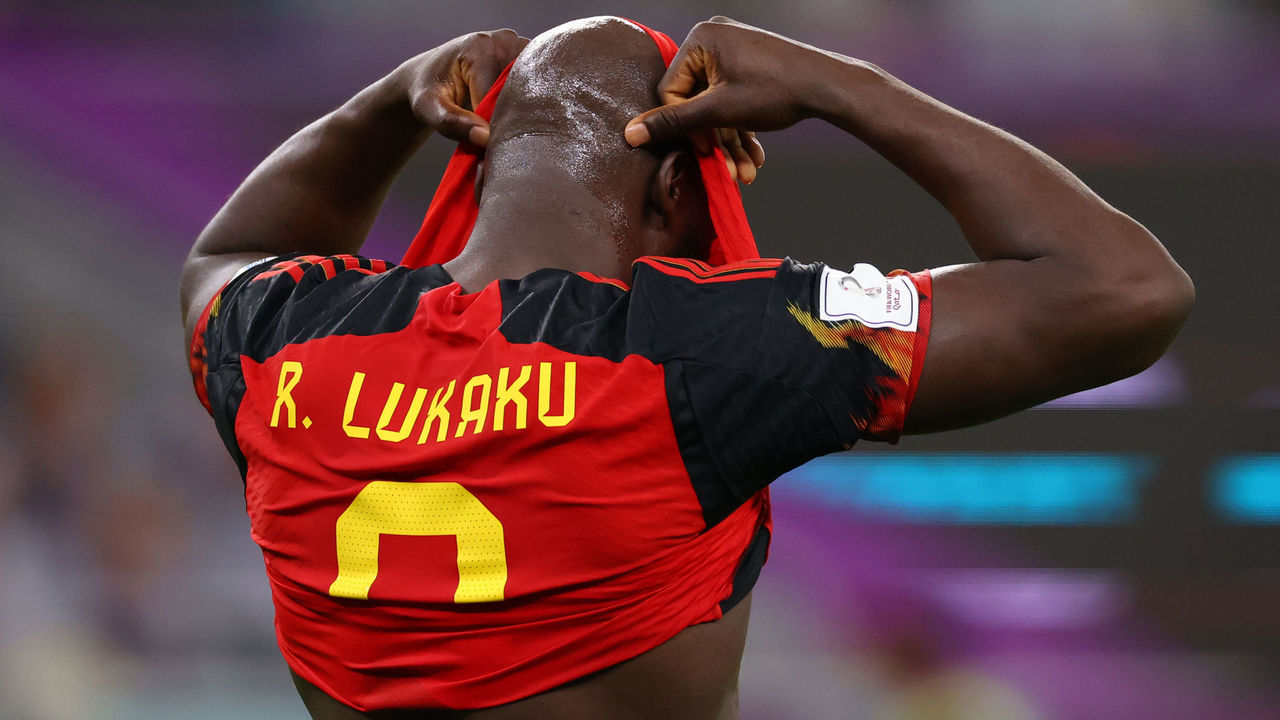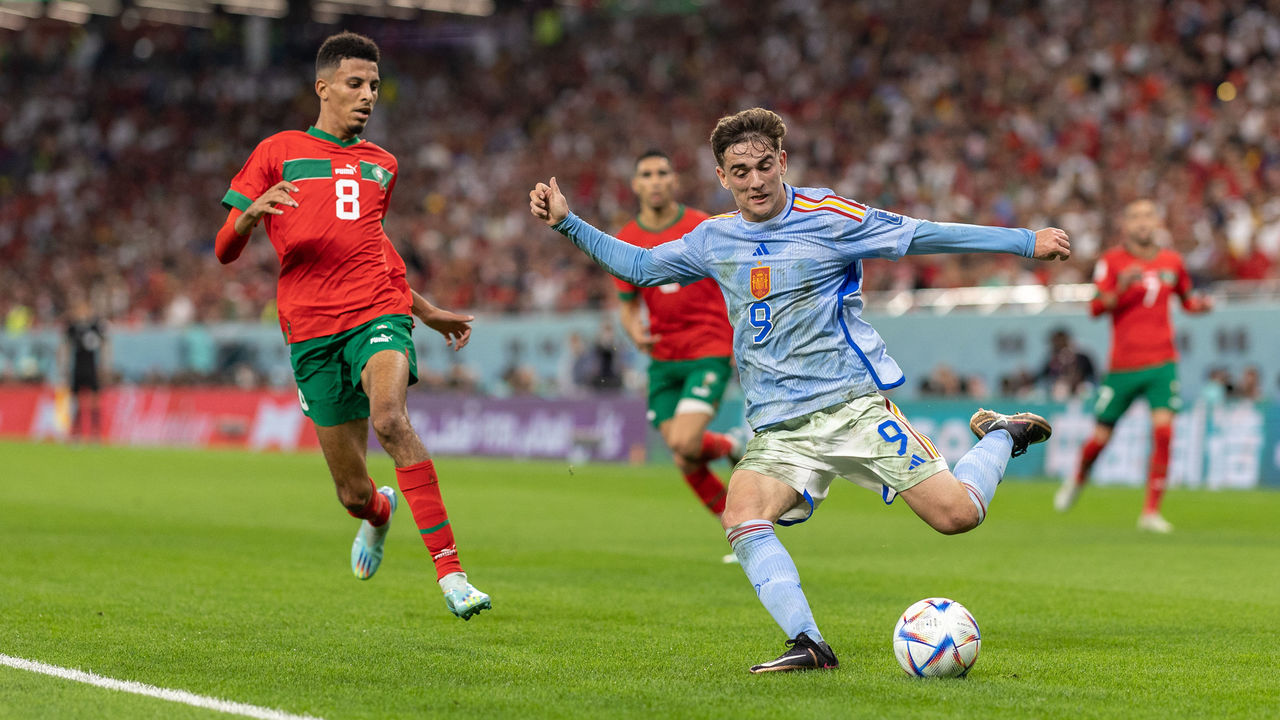The World Cup is being decided by moments. Who will seize their chance?
Romelu Lukaku could've changed everything.
First, the most prolific striker in the history of Belgian football hit the post. Then, he somehow missed an open net. When the ball bounced to him inside the six-yard box, he could only chest it into the goalkeeper's grateful arms. Belgium outshot Croatia 8-1 in the final 40 minutes of that match. Lukaku was expected to score 1.7 goals. Nothing doing. Croatia advanced, Belgium went home, and the story of the World Cup changed forever.
If Lukaku had converted just one of those chances - as he's made a career of doing - Belgium would've won. The Red Devils would've taken Croatia's place in the round of 16, where they would've faced - and likely beaten - Japan. Brazil would've faced a different opponent in the quarterfinals, and Croatia, one of the stories of this World Cup, wouldn't have had a chance to play in a second consecutive semifinal.
Many things happen in tournament settings that defy logic. How can an elite finisher like Lukaku miss so many golden opportunities in such a short amount of time? Would he have missed any at all if he wasn't nursing a thigh injury?

But Belgium wouldn't have wanted anyone else in those scoring positions. Nor would England have wanted anyone other than Harry Kane to take the second of its two penalties in Saturday's quarterfinal loss to France. Kane converted 56 of his previous 66 career attempts, including one earlier in that very same match. His 67th penalty kick didn't go so well.
That's because the World Cup isn't about who's most deserving. It's about who seizes the moment - and who does it most. It doesn't always reward the best teams or players. It's ruthless Darwinism, with evolution replaced by progress to the next round. There's no other way to explain how Dominik Livakovic, a goalkeeper Manchester United, Leicester City, and Nottingham Forest all passed on last summer, could emerge from the periphery to save three penalties, how Croatia could beat a tournament favorite like Brazil with a single shot on target, or how it could reach the semifinals with only a single regulation win to its name.
Here, philosophy goes out the window. Those who survive the longest win out.
The favorites, the most talented of the bunch, don't have months to prove they're the best. They have 28 days to show they can adapt to and overcome the vagaries of tournament football. The World Cup is the antithesis of club football, where it's easier to sell a vision and trust a process. Clubs can promise future success and achieve it with time. Coaches can afford to lose a few times over a 38-game season and still walk away with silverware. National teams don't have that luxury.
Still, Luis Enrique, Spain's righteous coach, stuck to his principles. Where did that get the Spanish? His players did everything he asked of them: They hoarded the ball, made thousands of passes, and waited for the right moment to strike. But those moments hardly ever arrived. Spain waited and waited for the perfect opening as its opponents improvised and eventually found out Spain wasn't so perfect after all.
Ask the Japanese how they beat La Roja in the final round of the group stage. Ritsu Doan scored off a turnover, and Kaoru Mitoma set up the winning goal after scrambling to keep the ball in play. Japan landed killer blows in all of 142 seconds. Spain spent two hours contemplating a philosophical breakthrough. Then, when Morocco took Spain to penalties in the round of 16, its players suddenly found themselves alone, square with the goalkeeper, textbooks to the side.
That's not to say teams have to rely solely on instinct to win tournaments. It's just harder to execute intricate passing plays in a time-restricted environment than it is to, say, defend as a unit. It becomes infinitely harder to do such on-field calculus with a mishmash of players like the Spain's. Trying to get 18-year-old Gavi to master the role of Andres Iniesta and 34-year-old Sergio Busquets to summon his inner Xavi is a tough ask.

In 2010, Spain boasted some of the most talented midfielders in the history of the game. Of course it could pick teams apart with surgical precision - and win doing so. It just wasn't going to happen in the same way in Qatar. Enrique's commitment to pass-first football didn't make Spain special. It made his team predictable. The Spanish had no answers for the spontaneity of the Japanese and Moroccans, and so they went out.
Argentina and France are the only heavyweights to have escaped the same fate as their heavily favored brethren. Though they've played well, they've also lived dangerously in the margins of victory and defeat. Remember when Emi Martinez's late heroics against Australia prevented extra time in the round of 16? His saves in last week's shootout win over the Netherlands may have taken all the headlines, but that outstretched save on Garang Kuol in the 97th minute was as necessary to the Argentinians' continued survival as Kane's miss was to the French.
Even if Argentina doesn't achieve what it's set out to do - to win the World Cup on Sunday - it won't face the same public inquest Brazil, England, and Spain are currently experiencing. Those countries are holding referendums on their identity, as if football is the one and only way to express it and the World Cup the one and only venue.
Lionel Scaloni, Argentina's level-headed coach, doesn't see it that way. He doesn't think the World Cup, or a game as haphazard as football, should define anyone. How can four weeks of pure randomness paint anyone as a success or a failure? It can name a winner and loser, and when it's all said and down, the record books will count Argentina as one or the other. But it can't come to mean anything more than that.
"It's hard to make people understand that the sun will rise tomorrow," Scaloni said. "Win or lose."
HEADLINES
- Fan group demands FIFA halt sales of 'extortionate' World Cup tickets
- World Cup Run-Up: Early predictions after the draw
- Latest phase of World Cup tickets on sale: How to apply, prices, controversy
- USMNT to face Senegal in pre-World Cup friendly
- Egypt, Iran complain about planned World Cup 'Pride' match in Seattle